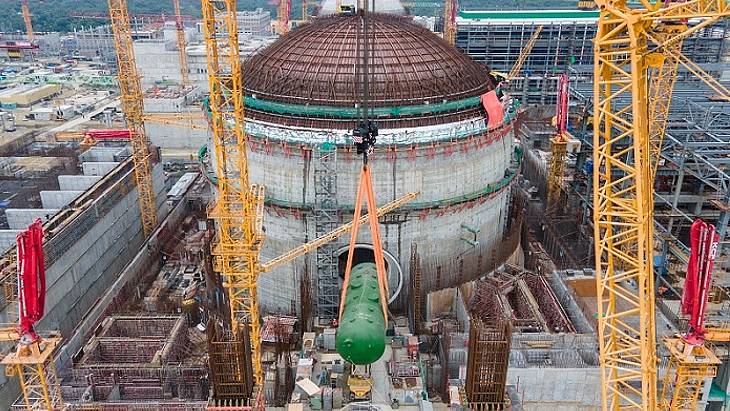Russia urges Bangladesh to resist sanctions pressure
Bangladesh's ambassador in Moscow was summoned to the Russian Foreign Ministry after "several dozen" Russian vessels were banned from calling at ports in Bangladesh, including at least one ship carrying equipment for the Rooppur nuclear power plant under construction.

The steam generator was installed in Rooppur unit 2 in October (Image: Rosatom)
The Russian Foreign Ministry's Maria Zakharova told a media briefing earlier this month that "as a specific example, we can mention the incident with the Russian ship Ursa Major, which in December 2022, at the request of the Americans, the authorities of Bangladesh withdrew their previously issued permission to enter the port of Mongla. Because of this, the delivery of a batch of equipment for the Rooppur NPP under construction was delayed for more than a month, which in no way meets the interests of the Bangladeshi side itself".
In a press briefing on Tuesday, following news that the ambassador had been summoned, Zakharova accused the USA of "increasingly forcing neutral countries to comply with anti-Russian sanctions".
"We have learned that several dozen Russian vessels have been banned from calling at ports in Bangladesh. We know that this unfriendly step was taken by the country's authorities not at all on their own initiative but under the threat of secondary sanctions by the United States ... it risks making the future of traditionally friendly Russia-Bangladesh relations contingent on the whims of a third country pursuing its own geopolitical goals.
"We expect the leadership of Bangladesh to find the strength to assert its national interests more resolutely. It is undoubtedly in their interest to develop a mutually beneficial partnership with Russia, which has come to the country's aid more than once in different periods of its history."
Russia's Tass news agency says that 69 Russian ships have been barred from the country's ports, although it said the Russian embassy in Bangladesh had confirmed there was no block on the import of Russian goods themselves, just the specific vessels.
Tass reported last week that the embassy had told it that work on Rooppur "is running according to plan, with all necessary equipment being supplied" with three ships carrying cargo for the facility arriving at the port of Mongla in Bangladesh. Tass also reported that Rosatom said that an alternative route for the delivery of cargo to the Rooppur NPP worksite had been found and was being utilised at the moment.
Bangladesh Foreign Minister AK Abdul Momen was quoted by RTV News in Dhaka last month as saying "we don't want to accept those ships which are under sanctions. We have developed good relations with the US" adding that it had been a surprise that Russia had sent a sanctioned vessel and he said he hoped that Russia would send non-sanctioned ships instead. The USA - and various other countries - have imposed a range of sanctions on Russia following its military action in Ukraine, which began in February 2022.
Rosatom in February 2011 signed an agreement for two reactors to be built at Rooppur for the Bangladesh Atomic Energy Commission. The initial contract for the project, worth USD12.65 billion, was signed in December 2015. The Rooppur plant, 160 kilometres from the capital Dhaka, will feature two Russian VVER-1200 reactors. Last October the project director Shaukat Akbar was quoted by the Dhaka Tribune as saying they were hoping to meet the target of starting production of the first unit on a trial basis by the end of 2023 and "be fully ready to supply in 2024".
Researched and written by World Nuclear News
- China Institute of Atomic Energy
- Nuclear Power Institute of China
- Southwestern Institute of Physics
- China Nuclear Power Operation Technology Corporation, Ltd.
- China Nuclear Power Engineering Co., Ltd.
- China Institute for Radiation Protection
- Beijing Research Institute of Uranium Geology (BRIUG)
- China Institute of Nuclear Industry Strategy (CINIS)
- China Nuclear Mining Science and Technology Corporation


